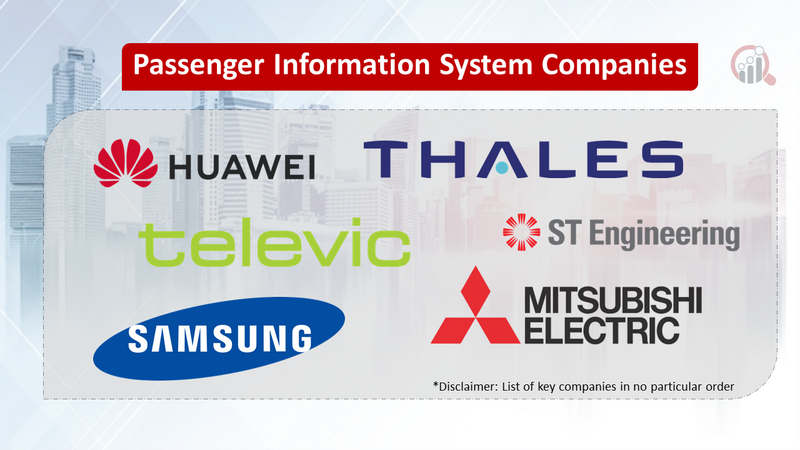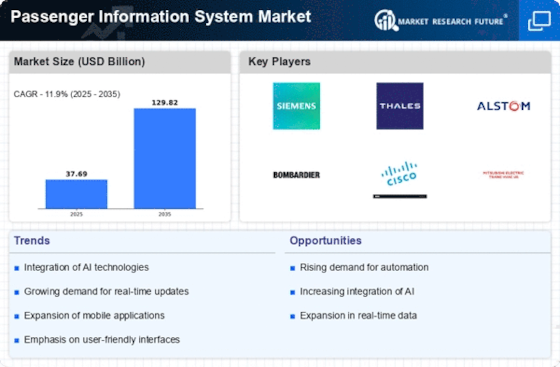Top Industry Leaders in the Passenger Information System Market

Competitive Landscape of Passenger Information System Market
The passenger information system market is a dynamic and growing market driven by increasing urbanization, rising passenger demand, and technological advancements. This market is characterized by a diverse set of players, including established multinational corporations, regional players, and emerging startups. Understanding the competitive landscape is crucial for both established players and potential entrants to navigate the market effectively.
Key Players:
- Huawei Technologies Co. Ltd (China)
- SAMSUNG (South Korea)
- com
- (South Korea)
- Mitsubishi Electric Corporation (Japan)
Strategies Adopted:
Key players in the passenger information system market are adopting various strategies to gain a competitive edge. These strategies include:
- Product innovation: Companies are continually innovating and developing new features and functionalities for their passenger information systems. This includes incorporating technologies like artificial intelligence, big data, and the Internet of Things (IoT) to provide passengers with real-time information and enhance their travel experience.
- Geographic expansion: Many companies are expanding their geographical reach by entering new markets and establishing partnerships with local players. This allows them to tap into new customer segments and increase their market share.
- Mergers and acquisitions: Mergers and acquisitions are a common strategy in the passenger information system market. This allows companies to acquire new technologies, expertise, and market share quickly.
- Focus on specific segments: Some companies are focusing their efforts on specific market segments, such as airports, railways, or bus rapid transit systems. This allows them to tailor their products and services to the needs of these specific segments.
- Partnerships: Partnerships with technology companies, system integrators, and other stakeholders are becoming increasingly important in the passenger information system market. This allows companies to leverage each other's expertise and resources to develop and deliver innovative solutions.
Factors for Market Share Analysis:
Several factors are considered when analyzing market share in the passenger information system industry. These include:
- Revenue: This is a commonly used metric for measuring the size and health of a company.
- Market share: This refers to the percentage of the total market that a company holds.
- Number of installations: This is a good indicator of the company's reach and installed base.
- Customer satisfaction: This is a key factor in determining a company's reputation and ability to retain customers.
- Innovation: This is crucial for a company to stay ahead of the competition and maintain its market share.
New and Emerging Companies:
Several new and emerging companies are entering the passenger information system market, driven by the growth of the industry and the availability of new technologies. These companies are often more agile and innovative than established players, allowing them to quickly adapt to changing market trends.
Current Company Investment Trends:
Companies in the passenger information system market are investing heavily in research and development (R&D) to develop new technologies and products. They are also investing in marketing and sales to increase their brand awareness and reach new customers. Additionally, companies are investing in partnerships and acquisitions to expand their reach and expertise.
Latest Company Updates:
On July 07, 2023, Wabtec Corporation, a leading global provider of digital solutions and value-added services, announced receiving an order for the German Transport Association's (VDV) tram-train procurement project in Austria and Germany. Wabtec will supply passenger information systems and pantographs for Stadler tram trains. This 10-year contract includes the supply of passenger information systems and pantograph design for another 258 vehicles.
On Aug. 09, 2023, NEC Corporation announced that NEC India has received a contract from Uttar Pradesh State Road Transport Corporation (UPSRTC) to implement the Vehicle Location Tracking-Passenger Information System (VLT-PSIS). This ambitious project aims to address crucial safety concerns in buses while elevating the overall travel experience of passengers through the implementation of advanced cutting-edge technologies.
On Dec. 07, 2022, Siemens announced that Televic Rail has awarded it a contract to supply its complete passenger information system and implement it on 60 new S200 light rail vehicles (LRVs) operated by Calgary Transit, the public transit service in Calgary, Canada. Televic Rail's passenger information system is based on its iCoM technology, and it will consist of advanced passenger information solutions, including an onboard CCTV system and ultra-wide TFT screens designed to show infotainment, advertising, and passenger information.
On Oct.17, 2022, GoMedia, a British supplier of entertainment management systems, launched a digital solution, VISOR, which it developed in partnership with RNIB and Icomera AB, a Swedish Telecommunications equipment company. Visor leverages GoMedia's live cloud-based passenger information system and NaviLens BIDI codes to display directions in the NaviLens and NaviLens GO apps.











